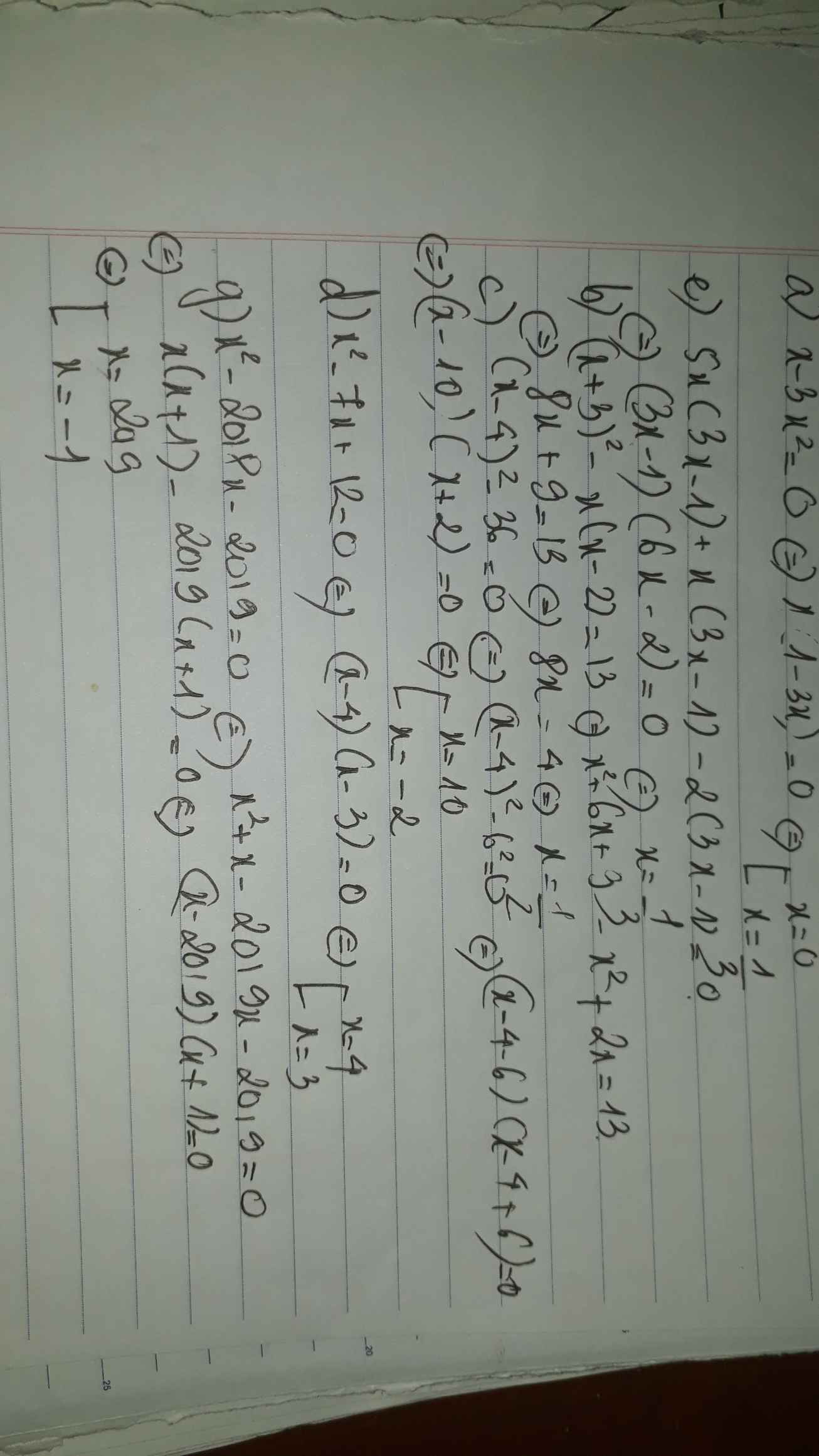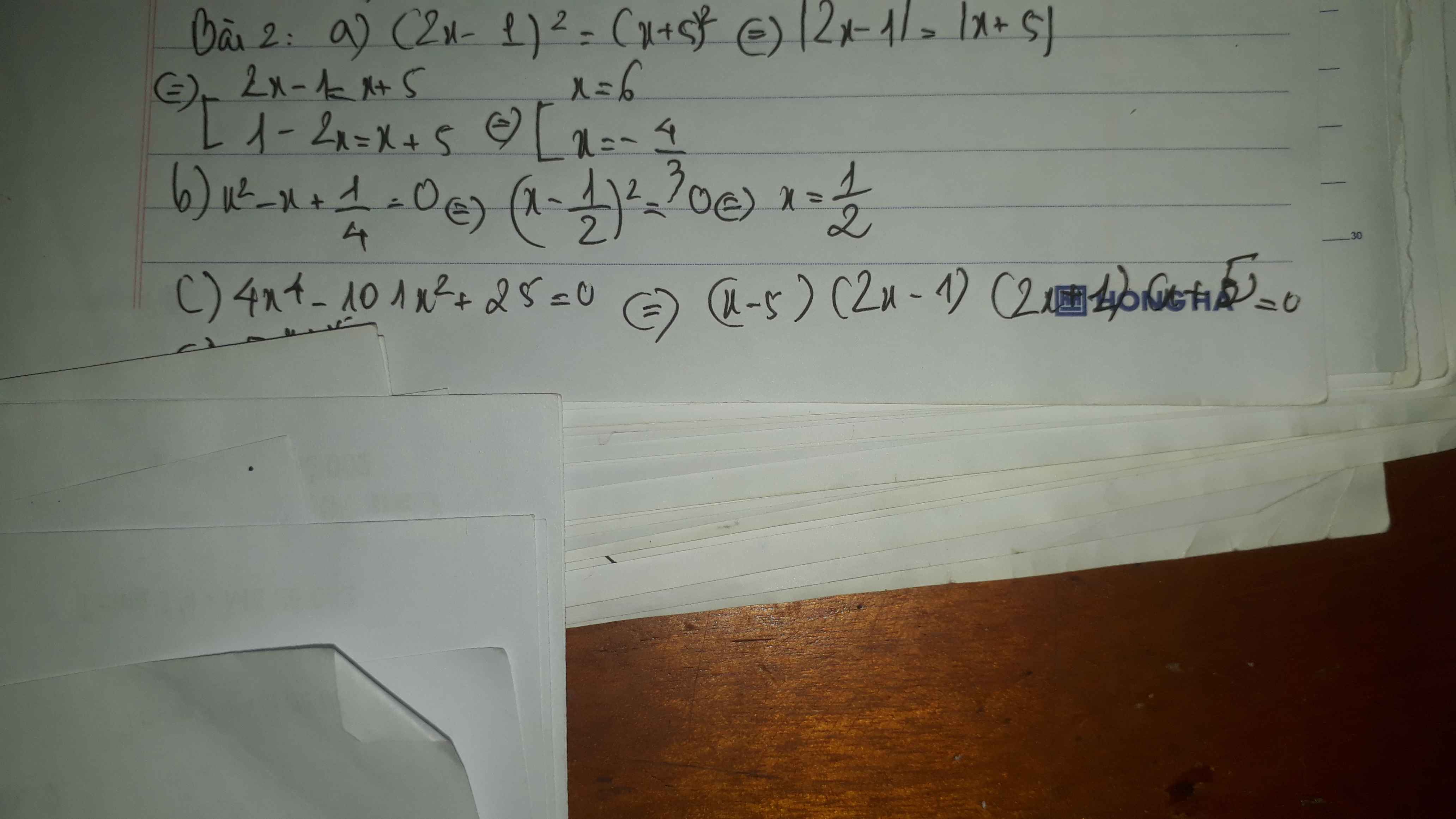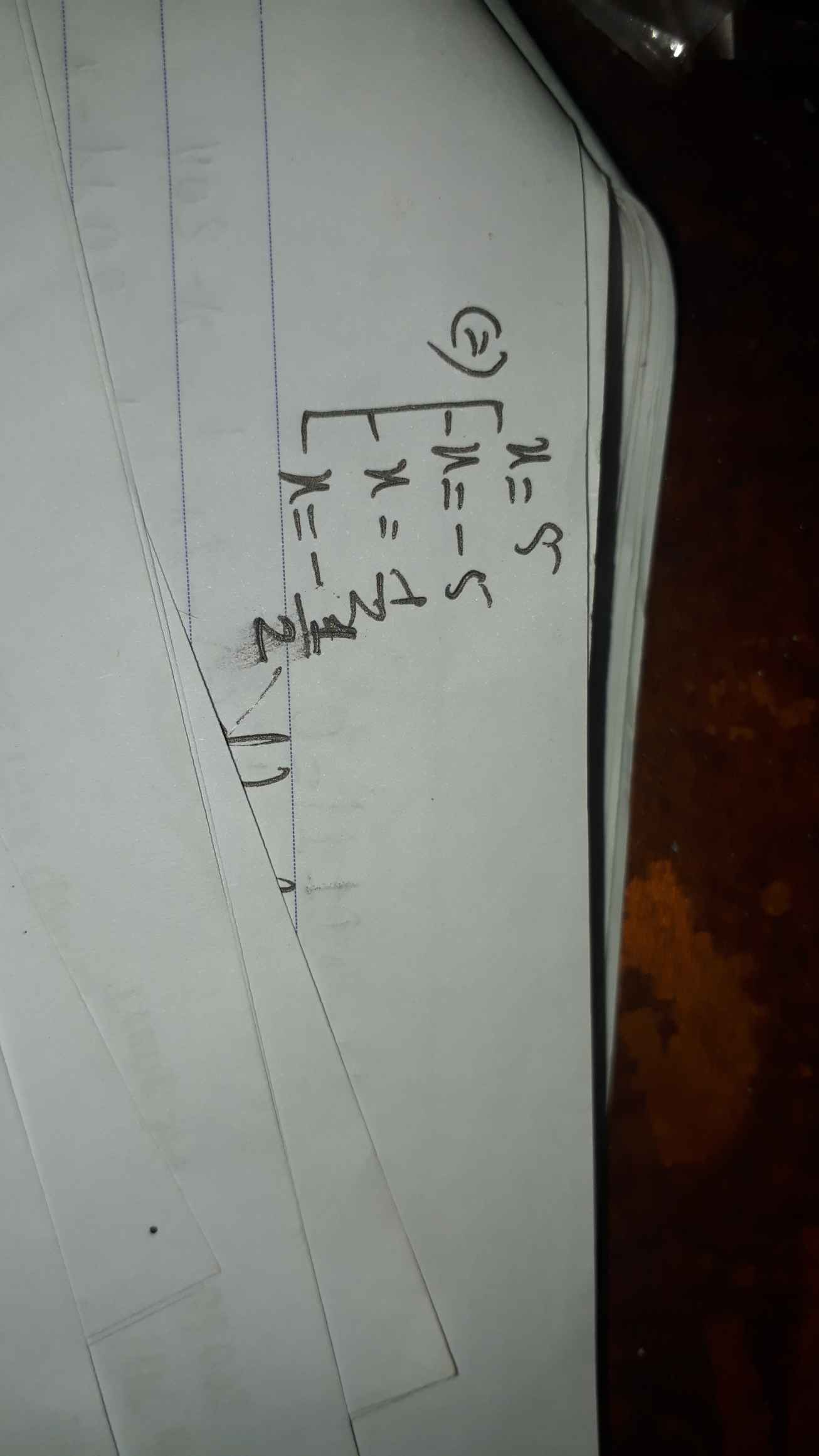Hãy nhập câu hỏi của bạn vào đây, nếu là tài khoản VIP, bạn sẽ được ưu tiên trả lời.

Bài 1:
a) (3x - 2)(4x + 5) = 0
<=> 3x - 2 = 0 hoặc 4x + 5 = 0
<=> 3x = 2 hoặc 4x = -5
<=> x = 2/3 hoặc x = -5/4
b) (2,3x - 6,9)(0,1x + 2) = 0
<=> 2,3x - 6,9 = 0 hoặc 0,1x + 2 = 0
<=> 2,3x = 6,9 hoặc 0,1x = -2
<=> x = 3 hoặc x = -20
c) (4x + 2)(x^2 + 1) = 0
<=> 4x + 2 = 0 hoặc x^2 + 1 # 0
<=> 4x = -2
<=> x = -2/4 = -1/2
d) (2x + 7)(x - 5)(5x + 1) = 0
<=> 2x + 7 = 0 hoặc x - 5 = 0 hoặc 5x + 1 = 0
<=> 2x = -7 hoặc x = 5 hoặc 5x = -1
<=> x = -7/2 hoặc x = 5 hoặc x = -1/5

1) Ta có: \(x^2-4x+4=0\)
\(\Leftrightarrow\left(x-2\right)^2=0\)
\(\Leftrightarrow x-2=0\)
hay x=2
Vậy: S={2}

Bài 12:
1) A = x2 - 6x + 11
= (x2 - 6x + 9) + 2
= (x - 3)2 + 2
Ta có: (x - 3)2 ≥ 0 ∀ x
Dấu ''='' xảy ra khi x - 3 = 0 ⇔ x = 3
Do đó: (x - 3)2 + 2 ≥ 2
Hay A ≥ 2
Dấu ''='' xảy ra khi x = 3
Vậy Min A = 2 tại x = 3
2) B = x2 - 20x + 101
= (x2 - 20x + 100) + 1
= (x - 10)2 + 1
Ta có: (x - 10)2 ≥ 0 ∀ x
Dấu ''='' xảy ra khi x - 10 = 0 ⇔ x = 10
Do đó: (x - 10)2 + 1 ≥ 1
Hay B ≥ 1
Dấu ''='' xảy ra khi x = 10
Vậy Min B = 1 tại x = 10

`Answer:`
Bài 1:
a) \(7+2x=22-3x\)
\(\Leftrightarrow2x+3x=22-7\)
\(\Leftrightarrow5x=15\)
\(\Leftrightarrow x=3\)
b) \(8x-3=5x+12\)
\(\Leftrightarrow8x-5x=12+3\)
\(\Leftrightarrow3x=15\)
\(\Leftrightarrow x=5\)
c) \(x-12+4x=25+2x-1\)
\(\Leftrightarrow x-12+4x-25-2x+1=0\)
\(\Leftrightarrow\left(x+4x-2x\right)+\left(1-12-25\right)=0\)
\(\Leftrightarrow3x-36=0\)
\(\Leftrightarrow x=12\)
d) \(x+2x+3x-19=3x+5\)
\(\Leftrightarrow6x-19=3x+5\)
\(\Leftrightarrow6x-3x=5+19\)
\(\Leftrightarrow3x=24\)
\(\Leftrightarrow x=8\)
Bài 2:
a) \(\left(2,3x-6,9\right)\left(0,1x+2\right)=0\)
\(\Leftrightarrow\orbr{\begin{cases}2,3x-6,9=0\\0,1x+2=0\end{cases}\Leftrightarrow\orbr{\begin{cases}x=3\\x=-20\end{cases}}}\)
b) \(\left(2x+7\right)\left(x-5\right)\left(5x+1\right)=0\)
\(\Leftrightarrow2x+7=0\text{ hoặc }x-5=0\text{ hoặc }5x+1=0\)
\(\Leftrightarrow x=-\frac{7}{2}\text{ hoặc }x=5\text{ hoặc }x=-\frac{1}{5}\)
c) \(\left(4x+2\right)\left(x^2+1\right)=0\)
\(\Leftrightarrow\orbr{\begin{cases}4x+2=0\\x^2+1=0\end{cases}\Leftrightarrow\orbr{\begin{cases}x=-\frac{1}{2}\\x^2=-1\text{(Loại)}\end{cases}}}\)
d) \(\left(x^2-4\right)+\left(x-2\right)\left(3-2x\right)=0\)
\(\Leftrightarrow x^2-4+\left(3x-2x^2-6+4x\right)=0\)
\(\Leftrightarrow x^2-4=\left(-2x^2+7x-6\right)=0\)
\(\Leftrightarrow x^2-4-2x^2+7x-6=0\)
\(\Leftrightarrow-x^2+7x-10=0\)
\(\Leftrightarrow x^2-5x-2x+10=0\)
\(\Leftrightarrow x.\left(x-5\right)-2.\left(x-5\right)=0\)
\(\Leftrightarrow\left(x-5\right).\left(x-2\right)=0\)
\(\Leftrightarrow\orbr{\begin{cases}x-5=0\\x-2=0\end{cases}\Leftrightarrow\orbr{\begin{cases}x=5\\x=2\end{cases}}}\)

\(a,\Leftrightarrow2x^2+10x-2x^2=12\Leftrightarrow x=\dfrac{12}{10}=\dfrac{6}{5}\\ b,\Leftrightarrow\left(5-2x-4\right)\left(5-2x+4\right)=0\\ \Leftrightarrow\left(1-2x\right)\left(9-2x\right)=0\Leftrightarrow\left[{}\begin{matrix}x=\dfrac{1}{2}\\x=\dfrac{9}{2}\end{matrix}\right.\\ c,\Leftrightarrow3x^2-3x^2+6x=36\Leftrightarrow x=6\\ d,\Leftrightarrow2\left(x+5\right)-x\left(x+5\right)=0\\ \Leftrightarrow\left(2-x\right)\left(x+5\right)=0\Leftrightarrow\left[{}\begin{matrix}x=2\\x=-5\end{matrix}\right.\\ e,\Leftrightarrow4x^2-4x+1-4x^2+196=0\\ \Leftrightarrow-4x=-197\Leftrightarrow x=\dfrac{197}{4}\)
\(f,\Leftrightarrow x^2+8x+16-x^2+1=16\Leftrightarrow8x=-1\Leftrightarrow x=-\dfrac{1}{8}\\ g,Sửa:\left(3x+1\right)^2-\left(x+1\right)^2=0\\ \Leftrightarrow\left(3x+1-x-1\right)\left(3x+1+x+1\right)=0\\ \Leftrightarrow2x\left(4x+2\right)=0\Leftrightarrow\left[{}\begin{matrix}x=0\\x=-\dfrac{1}{2}\end{matrix}\right.\\ h,\Leftrightarrow x^2+8x-x-8=0\\ \Leftrightarrow\left(x+8\right)\left(x-1\right)=0\Leftrightarrow\left[{}\begin{matrix}x=1\\x=-8\end{matrix}\right.\\ i,\Leftrightarrow2x^2-13x+15=0\\ \Leftrightarrow2x^2+2x-15x-15=0\\ \Leftrightarrow\left(x+1\right)\left(2x-15\right)=0\Leftrightarrow\left[{}\begin{matrix}x=-1\\x=\dfrac{15}{2}\end{matrix}\right.\)
 Bài 1.
Bài 1.

Bài 1)1)\(x^2+5x+6=x^2+3x+2x+6\)=0
=x(x+3)+2(x+3)=(x+2)(x+3)=0
Dễ rồi
2)\(x^2-x-6=0=x^2-3x+2x-6=0\)
=x(x-3)+2(x-3)=0
=(x+2)(x-3)=0
Dễ rồi
3)Phương trình tương đương:\(\left(x^2+1\right)\left(x+2\right)^2=0\)
Vì \(x^2+1>0\)
=>\(\left(x+2\right)^2=0\)
Dễ rồi
4)Phương trình tương đương\(x^2\left(x+1\right)+\left(x+1\right)\)=0
=> \(\left(x^2+1\right)\left(x+1\right)=0Vì\) \(x^2+1>0\)
=>x+1=0
=>..................
5)\(x^2-7x+6=x^2-6x-x+6\) =0
=x(x-6)-(x-6)=0
=(x-1)(x-6)=0
=>.....
6)\(2x^2-3x-5=2x^2+2x-5x-5\)=0
=2x(x+1)-5(x+1)=0
=(2x-5)(x+1)=0
7)\(x^2-3x+4x-12\)=x(x-3)+4(x-3)=(x+4)(x-3)=0
Dễ rồi
Nghỉ đã hôm sau làm mệt